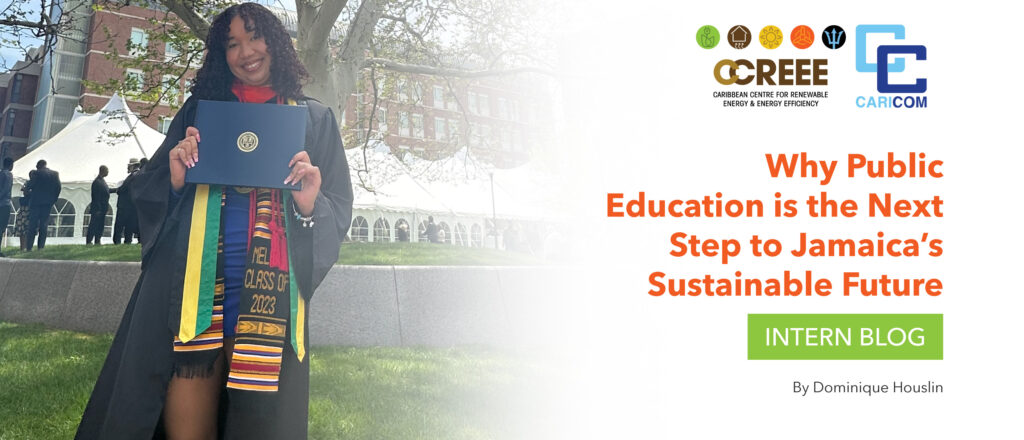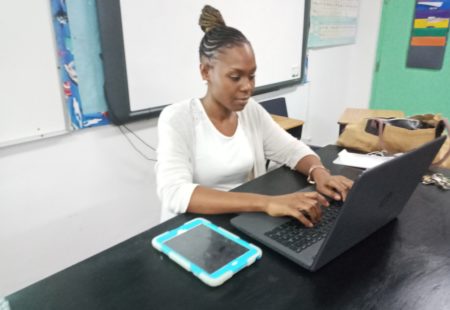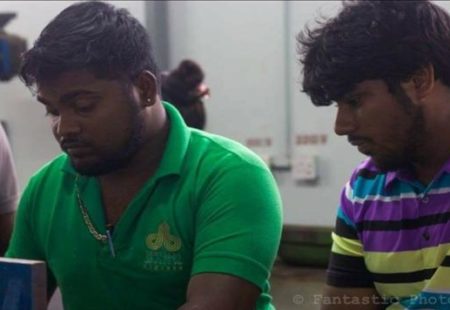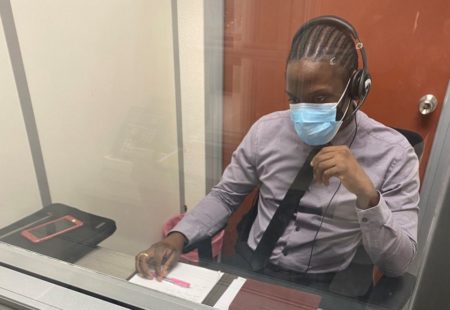Why Public Education is the Next Step to Jamaica’s Sustainable Future

By Dominique Houslin, Jamaica
Hi, everyone! I am Dominique Houslin, a recent graduate of the University of Rochester in New York where I earned a bachelor’s of science in mechanical engineering and a minor in environmental geology. I am also an incoming master’s student studying technical entrepreneurship and management with a specialisation in energy and the environment and materials science.
I was interested in interning at the Caribbean Centre for Renewable Energy and Energy Efficiency (CCREEE) because I wanted to learn more about sustainable energy in the Caribbean. My ultimate career goal is to contribute to the diversification of the region’s energy sector. During my internship I gained valuable insights into energy in Jamaica, including learning about various upcoming projects and the policies, legislation and regulations surrounding them.
One of the most interesting projects was the CCREEE’s Energy Report Cards. Those assessments provide a comprehensive evaluation of each country’s energy sector, which is crucial for educating the public about energy efficiency as well as promoting the implementation of renewable energy projects. I also learned of various energy projects currently being implemented that are focusing on technical assistance, energy efficiency and renewable energy. Highlighting those projects demonstrates to the public the importance of such issues and what measures are being taken to promote a more sustainable future.
Here are two ways that education can contribute to solving Jamaica’s energy problem:
Educating the public through newspaper articles, nationwide campaigns and incorporating the energy problem into the school curriculum would significantly increase public awareness and engagement. Each method of communication should be targeted towards different age groups. For example, nightly television commercials and news reports would mainly appeal to middle-aged adults who normally are home from work and watch the news. For teenagers, social media engagement and challenges are the best ways to keep them involved. Older people could be informed through newspaper articles and radio broadcasts.
Another effective way to educate the public is to focus on how energy efficiency can benefit their lives, including their jobs. A more targeted approach is beneficial because individuals see benefits on a case-by-case basis. Installing solar panels might have a high upfront cost, but for families, this investment is beneficial in reducing their long-term energy bill, and they can sell excess energy back to the grid. Installing wind turbines on large farms can help reduce farmers’ dependence on the grid.
Jamaica has done an impressive job by offering multiple sustainability and energy courses at the tertiary level. However, an earlier introduction to courses such as Green Engineering and Environmental Science/Health can help students explore that realm, allowing them to develop an interest and, possibly, enter that career field.
Although I did not take CAPE green engineering or environmental science, I ultimately pursued an energy-related career. I went on field trips and information sessions at school that taught me about alternative energy and how various Caribbean countries have begun to transition. Hearing the myriad of opportunities solidified my decision to explore that field and use my engineering knowledge to help propel the energy revolution in Jamaica.
When individuals witness the impact of their energy usage and its alignment with government initiatives, they are more inclined to decrease their energy consumption. By understanding the collective efforts of policy, legislation, regulation and future projects, people feel empowered to make positive changes in their own energy usage habits.
Learning about Jamaica’s sustainability initiatives can inspire individuals to act towards reducing their energy consumption. It also can motivate them to hold government officials accountable and make a positive impact on their energy footprint, no matter how small they might think their efforts are. As the saying goes, “Every mickle mek a muckle”— every little bit counts towards creating a bigger change.



